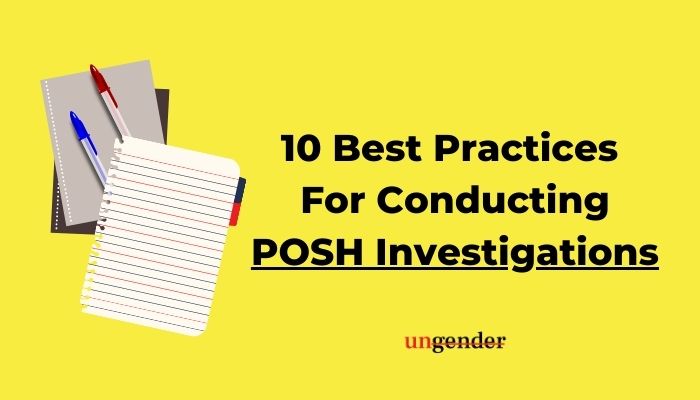POSH Guide: 10 Best Practices For Conducting Sexual Harassment Investigations

Written by: Team Ungender
The Internal Complaints Committee of an organization is comprised primarily of members who have been selected for their eligibility under the POSH Act, 2013, and for their understanding of the organization’s culture and dynamics affecting employee engagements.
It also means that they are appointed as part of an investigation team holding some of the power of a Civil Court, and are expected to be fair, transparent, unbiased, and follow all procedural and documentation guidelines of the law.
This is also the reason why the law emphasizes on the training and capacity building of these members. Yes, one may rely on the External Member for guidance, but finding an expert external member is difficult and like any quality resource, their affordability will become a question.
We have put together these tips for better management of investigations. Implementing them is not too difficult and should definitely allow you to manage multiple and parallel investigations better:
1. Have SLAs for the smooth functioning of the Committee
Even though the law has provided a larger level timeline (up to 90 days) and various other for some of the stages of the investigation process, it is efficient to break down the process further and assign timelines for them and establish some service-level agreements (SLAs).
For example, if a complaint is received by the
Committee, what should be the turnaround time for a response to the Complainant? In how many days should the first meeting with the Complainant happen? After a meeting, how much time is allotted for the minutes to be prepared, shared, and signed by the concerned parties? These are just some of the examples.
2. Identify and assign roles and responsibilities for different activities of the investigation
The role of the Chairperson has been expressed as a crucial one in the law. However, the Committee requires the following: assignment of roles on administration, operational arrangement, budget approval, documentation preparation, and much more. It is important that these tasks are identified and assigned in advance for the Committee to be process-oriented.
3. Make templates for as many communications task as possible for as many activities that you can
The POSH law has put a lot of focus on documentation. One must document EVERYTHING. In the process of investigation, identify all the basic and routine communication that will take place – response to the Complainant, intimation to the Respondent, the summoning of the Witness/es, confidentiality guidelines, and more. Making go-to templates for these communications tasks will save a lot of time.
4. Have a master sheet that will provide you the birds-eye view of the dates and stages of your multiple investigations
This will prevent any confusion on the status report of multiple investigations and provide you the framework for adherence to timelines.
5. Invest in regular training of the Committee members and keep refining the process
Various organizations conduct a one-off training session for their Committee members and leave it at that. One needs to remember that Committee members are experts in different domains and their appointment as part of this Committee requires them to build the knowledge and skills for this role. Any mistake on their part will have an impact on both finances and reputation.
6. Keep yourself updated with the latest judgments on the law to avoid making mistakes in the procedure
Use the quarterly meetings wisely and get your External Member to share the latest judgments with your Committee members. Law and its Rules were written some time ago but it is these judgments that are providing clarity on various ambiguities of the law. For example: did you know that in a recent judgment, the Court agreed for appeal by the Accused on the decision of the Committee because the quorum was all female? This definitely violated the principles of natural justice under this law.
7. Have a data storage and privacy policy in place
With the strong emphasis on confidentiality under this law, and responsibility on the Committee to maintain the investigation records with them, define the procedure and structure for the data related to investigations. Will you follow a completely paperless approach or will you follow a hard copy file approach? Who will have the passwords and keys to the files? If and when a member of the Committee leaves, how will the handover happen? Have you thought about all this? If not, then it is time to do so.
8. Allot a budget for Committee activities, especially for investigation expenses.
At times, extended working hours maybe required. At times, an investigation may require travel and accommodation. In unique situations where a translator or special assistance is required, additional expenses occur.
To avoid delays in the investigation process, it is best to identify and allocate a nominal budget for the activities of the Committee. Last-minute and impromptu approvals only end up delaying the process.
9. Identify the various degrees of workplace sexual harassment and have an indicative process and consequences assigned to them
While the law has provided the larger definitions of what all can constitute as workplace sexual harassment and who all the Complainant and Respondents can be – practically, it becomes quite a challenge and time consuming when unique situations arise.
For example: having clarity on the way forward if either of the parties is not from the Company, or if the incident happens from a Customer, or when a third-party vendor and primary employee are involved. Such unique situations should be pre-empted.
10. Have a counsellor on board for emergencies and assistance
Several Committees are realizing the need for a Counsellor for on-going and post-investigation support for the parties involved. Having a qualified and well-briefed Counsellor will provide the empathetic support to the involved individuals, as required and intended by the law.
Ungender Insights is the product of our learning from advisory work at Ungender. Our team specializes in advising workplaces on workplace diversity and inclusion. Write to us at contact@ungender.in to understand how we can partner with your organization to build a more inclusive workplace.
Read our insights about diversity, legal updates and industry knowledge on workplace inclusion at Ungender Insights. Visit our Blog.
Sign up to stay up-to-date with our free e-mail newsletter.
The above insights are a product of our learning from our advisory work at Ungender. Our Team specialises in advising workplaces on gender centric laws.
or email us at contact@ungender.in




